4 top online shop solutions
Our pick of the best services to add ecommerce functionality to your website or blog.
Daily design news, reviews, how-tos and more, as picked by the editors.
You are now subscribed
Your newsletter sign-up was successful
Want to add more newsletters?

Five times a week
CreativeBloq
Your daily dose of creative inspiration: unmissable art, design and tech news, reviews, expert commentary and buying advice.

Once a week
By Design
The design newsletter from Creative Bloq, bringing you the latest news and inspiration from the worlds of graphic design, branding, typography and more.

Once a week
State of the Art
Our digital art newsletter is your go-to source for the latest news, trends, and inspiration from the worlds of art, illustration, 3D modelling, game design, animation, and beyond.

Seasonal (around events)
Brand Impact Awards
Make an impression. Sign up to learn more about this prestigious award scheme, which celebrates the best of branding.
Getting into ecommerce is simpler than ever. There are plenty of great places to sell your work online, but if you have some basic tech skills, you can create a unique, personalised experience by adding retail functionality to your own website (got a website to create? Pick a top website builder). There are a number of different services to help you do this. Here, we take a look at the most popular ecommerce solutions, and explore the benefits and drawbacks of each.
For a bunch of hosting solutions, see our guide to web hosting services. And be sure to back up your content in cloud storage.
01. Shopify
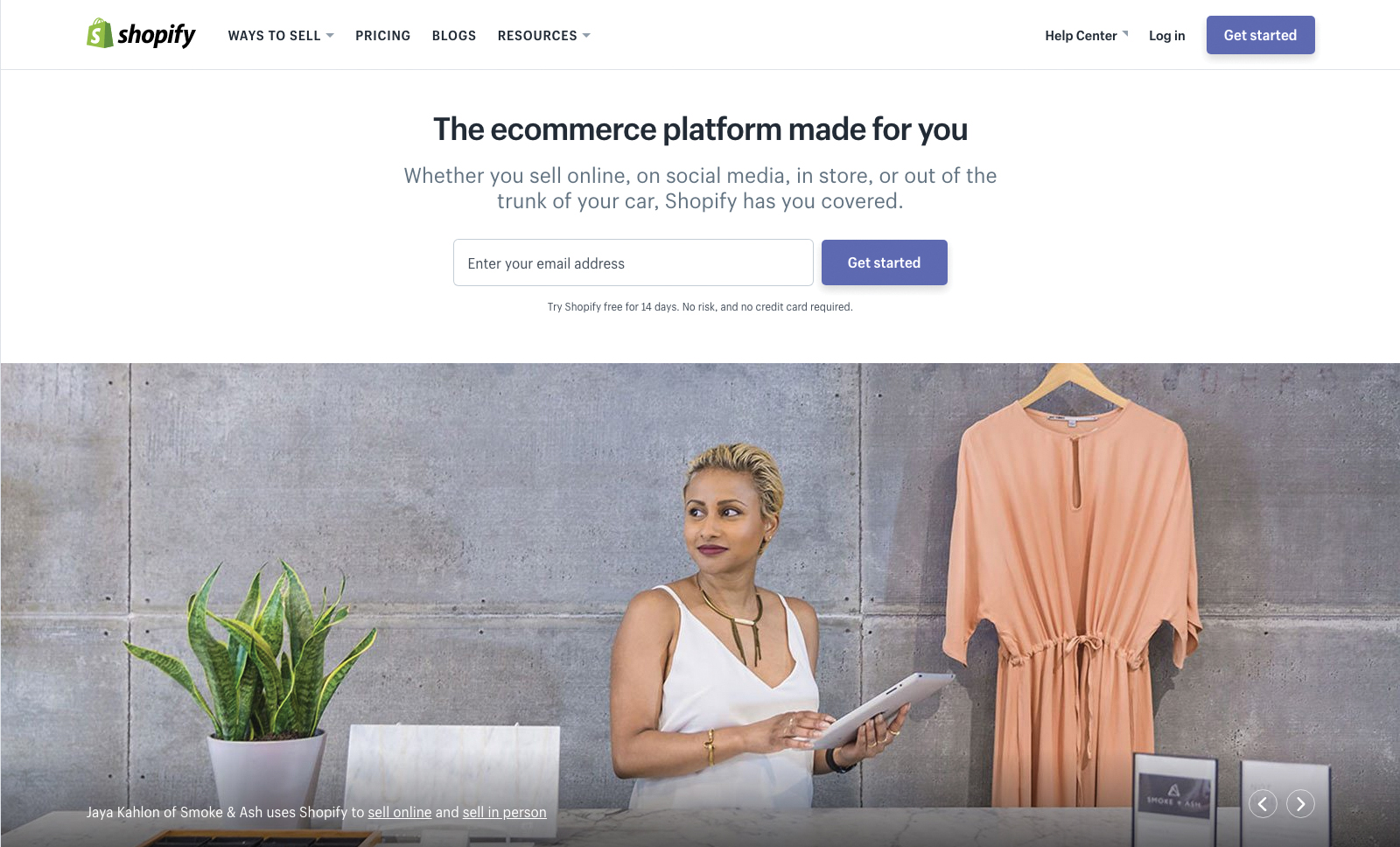
- Price: From $29/mo
Shopify is one of the biggest and the most well known ecommerce solutions available to the general public. At time of writing, there were three different packages available: the basic one starting at $29 per month, ranging to $299 a month for more advanced ecommerce features. Shopify charges a 2.2 per cent fee, plus an extra 20p for each online sales.
Pros
If you're looking for simple setup, quick sales and a way to easily expand your business online, Shopify is a great choice. Its packages take care of much of the boring, tedious stuff associated with selling things online, offering services such as 24/7 support, free SSL certificates and fraud analysis.
Cons
As a blogging or online store platform, Shopify struggles to compete with the likes of WordPress, with its content management ease and SEO features. As a developer, the limited support for custom code or scripts can be frustrating. What's more, most of Shopify's features are locked in, which means switching to another platform can be tricky.
02. WooCommerce
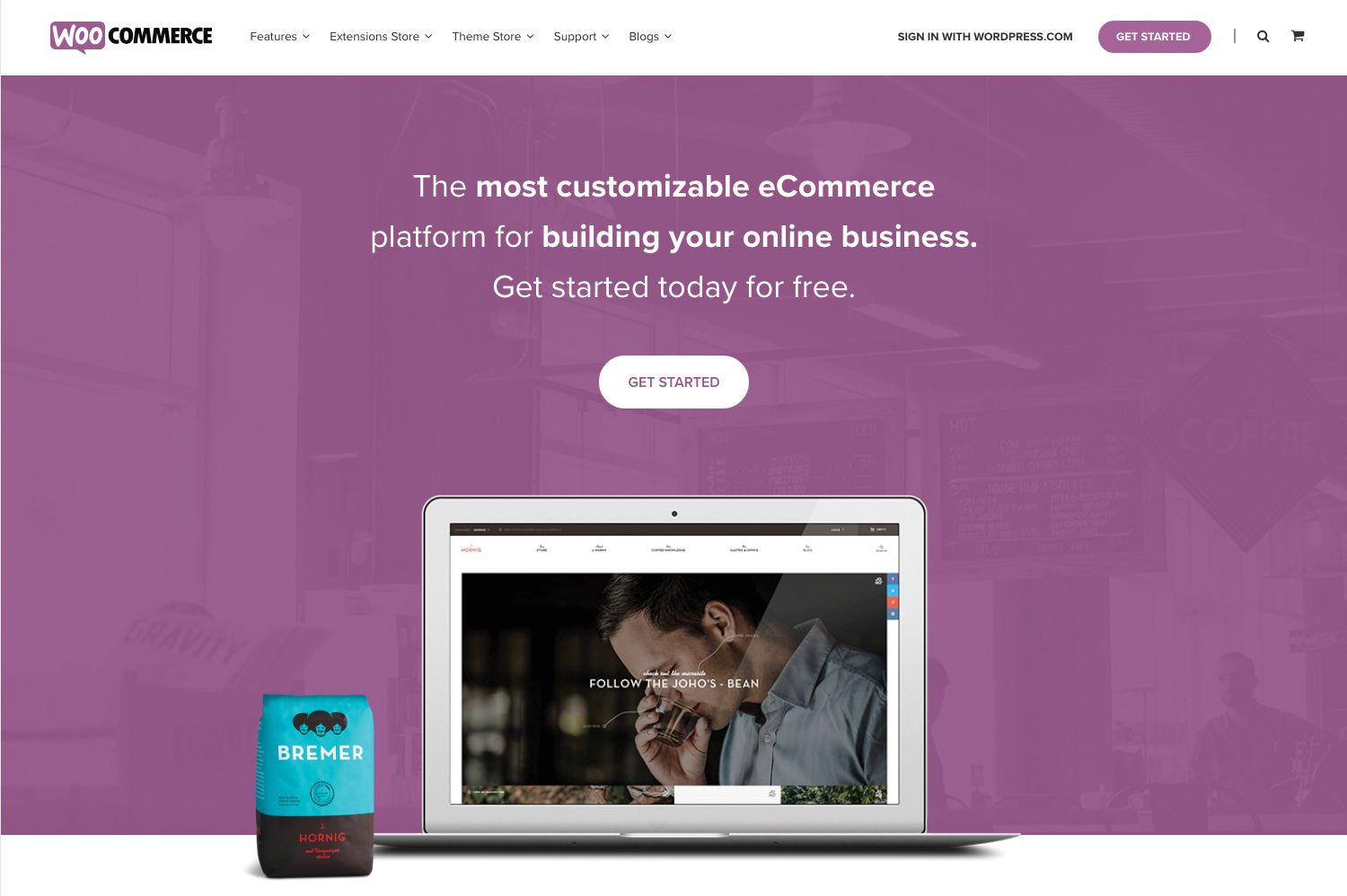
- Price: Free
WooCommerce is one of the most popular free WordPress plugins available. It essentially enables you to turn your WordPress website or blog into an online store by adding ecommerce functionality, enabling you to process digital and physical orders through the power of WooCommerce.
Pros
In ecommerce, it's key to separate yourself from your competitors. WooCommerce provides plenty of customisation features, including themes and more plugins to change the styling of your shop, expand accessibility, and more. It also improves security when processing transactions, taking all the worry away from you as an owner, and your customers.
Daily design news, reviews, how-tos and more, as picked by the editors.
Another great feature of WooCommerce is its vast range of analytics tools. These are great for engaging with customer purchases and activity and crunching stats, making the whole process of analysing your retail activity simple.
Cons
While WooCommerce itself is free, once you've purchased various supplementary themes and plugins it can become very expensive very quickly. You can customise your shop on your own if you have the skills, but otherwise you’ll need to buy a pre-made theme.
03. BigCommerce
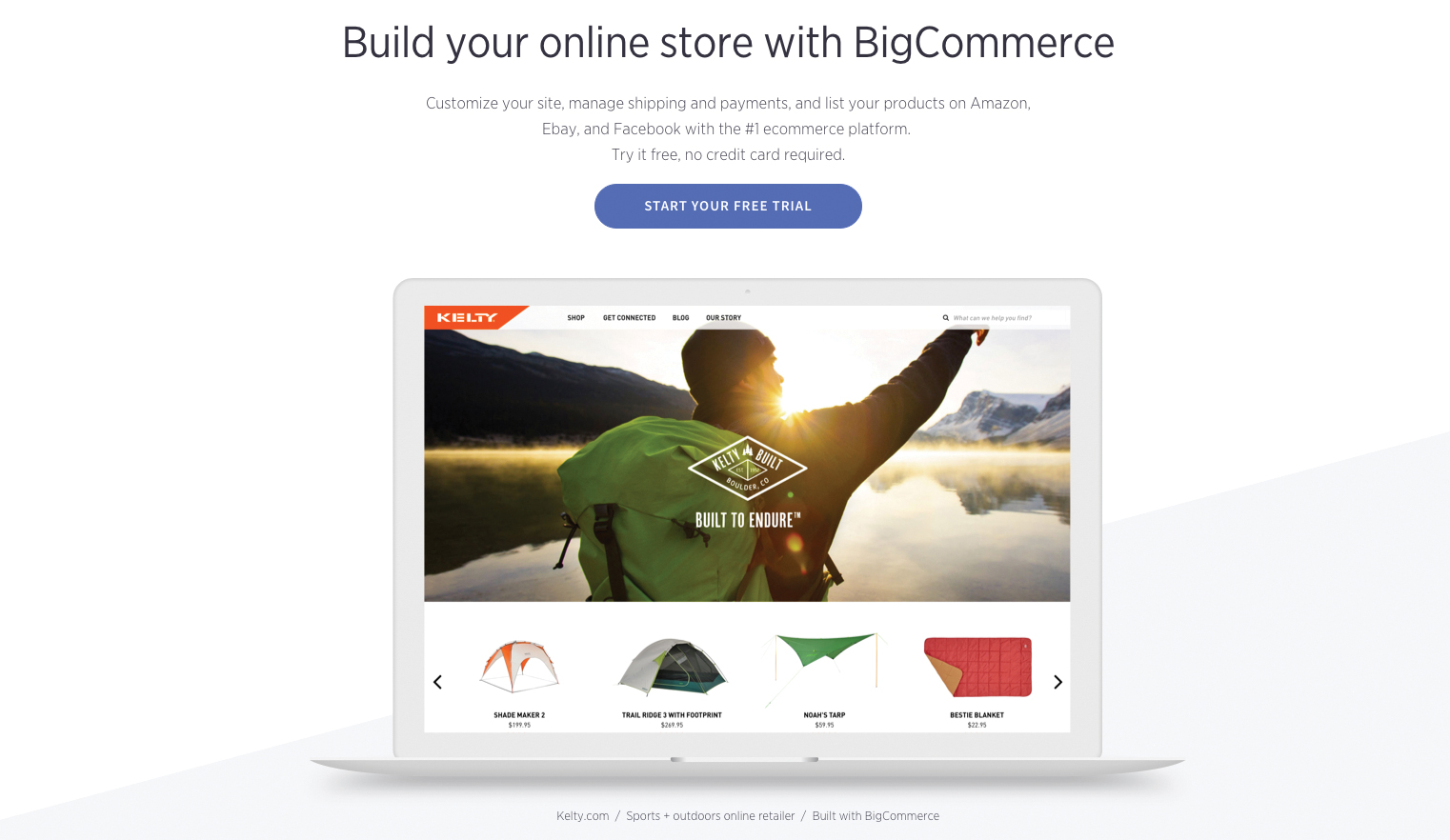
- Price: From $29.95/mo
BigCommerce is a paid hosting service for online shops processing physical or virtual transactions, and it boasts clients such as Toyota, Kodak and Martha Stewart. This service is aimed at users with web design skills, and offers customers the ability to personally customise their sites (there's also a theme store, where users can buy and sell themes for BigCommerce shops).
The platform offers users the opportunity to list their products on Amazon, eBay, Facebook and more. There's a range of subscription options, providing solutions for independent businesses with small, frequent transactions right up to mass sales for high-volume businesses.
Pros
BigCommerce offers full CMS features, enabling you to change content easily, provide discounts and coupon codes to customers, and optimise your site for search engines. For savvy users, there’s even the ability to tweak the CSS and HTML.
Cons
BigCommerce places limits on your annual sales – at the standard package you’re limited to a $50,000 processing fee per annum. If you choose Braintree for payments you may encounter a 2.9 per cent fee on each credit card transactions from PayPal, too.
04. Volusion
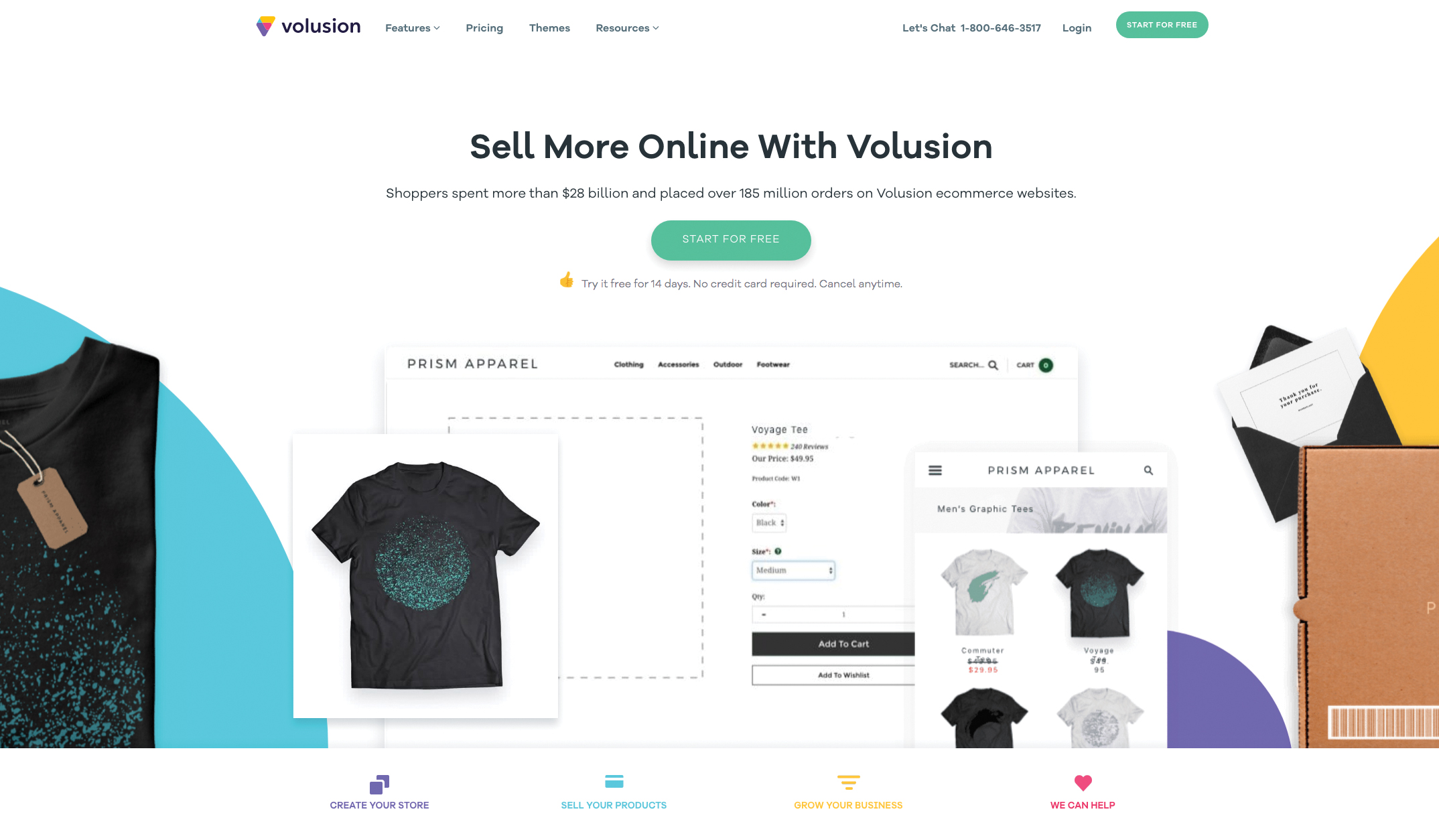
- Price: Free
Like all other good ecommerce platforms, Volusion aims to help you focus more on the selling and less on the tedious tasks surrounding it. The most basic package costs $15 per month and offers support for 100 products, a secure checkout, online support and 1GB of bandwidth (more on this later).
Pros
Volusion provides you with the tools to quickly design and deploy a website, including a simple editor and theme picker. It offers 11 free themes and 38 premium themes starting at $180. Unlike to other ecommerce platforms here, Volusion doesn't charge any transaction fees, so you get to keep all your profits. Your monthly package also includes 24/7 customer support, which is handy if you're just starting out with ecommerce.
Cons
Subscriptions include a strict bandwidth limit on your site. If you have large images or content, they’re going to eat up your 1GB of monthly bandwidth pretty quickly – and the more visitors your attract, the more bandwidth you’re going to need. You’ll soon have to buy more bandwidth to keep your store up and running, especially during peak times.
What's more Volusion doesn’t offer free SSL certificates or any blogging functions, something deemed quite critical for marketing and providing a secure transaction environment.
This article was originally published in creative web design magazine Web Designer. Buy issue 270 or subscribe.
Read more:
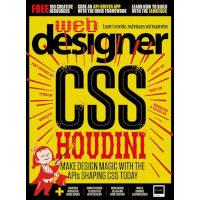
Web Designer is the premier magazine for aspiring online creatives and industry professionals. The monthly title offers cutting-edge practical projects spanning XHTML, CSS, Flash and WordPress as well as hosting features and interviews with the web community’s most influential people. Each issue also has a dedicated Industry section covering news and views from the trade, website showcases featuring the finest design talent and a free CD of valuable resources.
